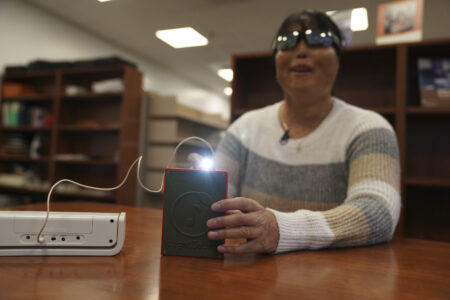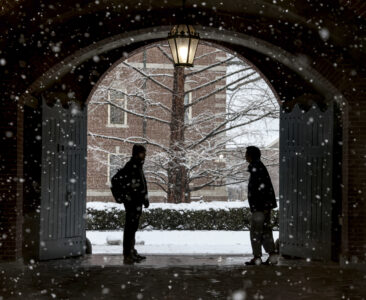Living independently while visually impaired
Teacher visits Gwinn Clubhouse for presentation

A graphic showing the different views seen by a person with normal vision and one with macular degeneration. That condition was discussed during an Aug. 9 presentation about Michigan’s Bureau of Services for Blind Persons at the Gwinn Clubhouse. (Courtesy of allabouteyes.com)
- A graphic showing the different views seen by a person with normal vision and one with macular degeneration. That condition was discussed during an Aug. 9 presentation about Michigan’s Bureau of Services for Blind Persons at the Gwinn Clubhouse. (Courtesy of allabouteyes.com)
- Pat Duyck of the bureau’s Escanaba office speaks to local seniors during the event. Duyck discussed ways the bureau can help seniors with visual challenges. (Journal photo by Christie Bleck)
Pat Duyck, an Escanaba-based rehabilitation teacher with Michigan’s Bureau of Services for Blind Persons, which is part of the Michigan Department of Licensing and Regulatory Affairs, spoke on this issue Aug. 9 at the Gwinn Clubhouse.
The bureau’s Independent Living Program focuses on legally blind people age 55 or older who, as the name says, want to continue living at home in a self-sufficient way.
The program is for people who don’t want to continue to work but are having vision problems, Duyck said.
“Our Independent Living Program is meant to help you stay in your homes and be independent,” she said.

Pat Duyck of the bureau’s Escanaba office speaks to local seniors during the event. Duyck discussed ways the bureau can help seniors with visual challenges. (Journal photo by Christie Bleck)
To be eligible for the program, a person must meet at least one of these criteria:
– visual acuity with best correction must be 20/200 or worse in the better eye;
– visual fields must subtend an angle of less than 20 degrees in each eye;
– visual acuity with best correction must be 20/100 or worse in the better eye with a prognosis of rapid deterioration.
Duyck said people with glaucoma have visual field loss, meaning they don’t see peripherally.
“If your peripheral vision comes all the way to the 20-degrees loss, then you’re also considered legally blind,” Duyck said. “Even if you have really good central vision, you can still be getting our services.”
Duyck said she will call a person seeking help from the bureau to set up an in-home visit. However, people must call their physicians, who send medical information indicating their patients are legally blind to the bureau.
“People who have visual impairments, people who are older, can’t drive, right?” Duyck said. “So, if you no longer have a driver’s license, you don’t have to worry about getting out and coming in for an appointment like you do for the doctor’s. I’ll come to your house.”
The initial appointment usually lasts several hours and covers things like using the telephone and kitchen items.
“We come up with some real simple fixes sometimes for those kinds of things,” Duyck said.
One of those easy fixes involves using magnifiers, and she pointed out people will be taught how to use them.
“With your macular degeneration, you can actually see through the magnifier,” Duyck said.
Duyck asked the audience members if they had a particular vision problem, like macular degeneration, glaucoma or cataracts.
Hands, of course, went up, mostly for macular degeneration, which was a focus of Duyck’s presentation.
She explained the condition using a model of an eyeball. The “dry” type involves a fatty deposit that builds up over the macula, causing a central vision blind spot. The “wet” type involves blood vessels growing in the eye where they don’t belong, with those weak vessels bleeding over the macula.
“And there goes the vision,” Duyck said. “But those bleed all over the eye, and those can cause complete blindness.”
However, laser injections that stop the bleeding now are available, she said.
A challenge in the remote Upper Peninsula, though, is finding help. One woman said she has to travel to Green Bay, Wisconsin, to see a retinal specialist. However, Duyck said help in that area can be obtained in Ironwood.
That’s still not in the audience members’ backyards, and is about as far away as Green Bay.
“I’m really surprised that Marquette doesn’t have a retinal specialist,” Duyck said. “There’s enough people that have this issue that I would think it would be beneficial.”
Brian Veale, director of the Forsyth Senior Center, mentioned transportation help for outside Marquette County, depending on driver availability, can be obtained from Love INC CUP.
That church-affiliated group, based in Ishpeming, can be reached at 906-486-8287.
Duyck acknowledged the issue for most people in such situations is driving.
“Driving and reading are the two things that are the hardest to give up,” Duyck said.
The Bureau of Services for the Blind has other focuses apart from its Independent Living Program.
The bureau’s biggest effort is its vocational rehab program, Duyck said.
“We provide services to help them either get back to work, to go back to school or to stay in their jobs,” Duyck said.
There are pre-employment training programs for people in that program.
“Our big push right now is getting kids who are going to be graduating, getting them to continue on to college or get jobs,” Duyck said.
The bureau also runs the Youth Low Vision program for children in the school system with a 20/70 visual acuity. The agency, Duyck said, covers costs for those with no insurance for eye appointments or special devices.
For more information on the bureau’s services, call 800-292-4200 or visit www.michigan.gov/lara/.
Christie Bleck can be reached at 906-228-2500, ext. 250. Her email address is cbleck@miningjournal.net.






